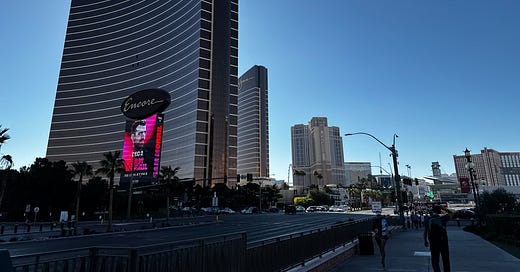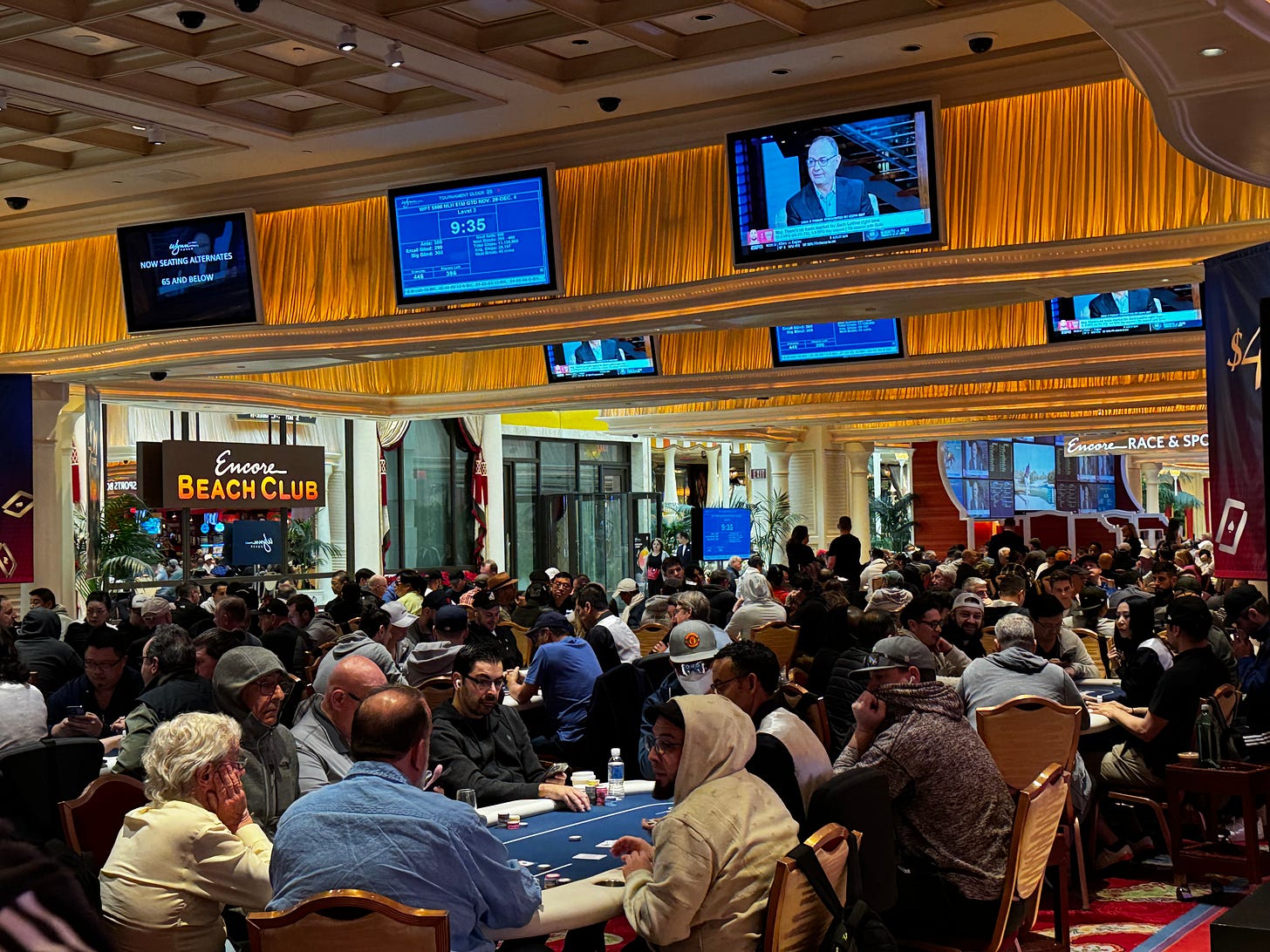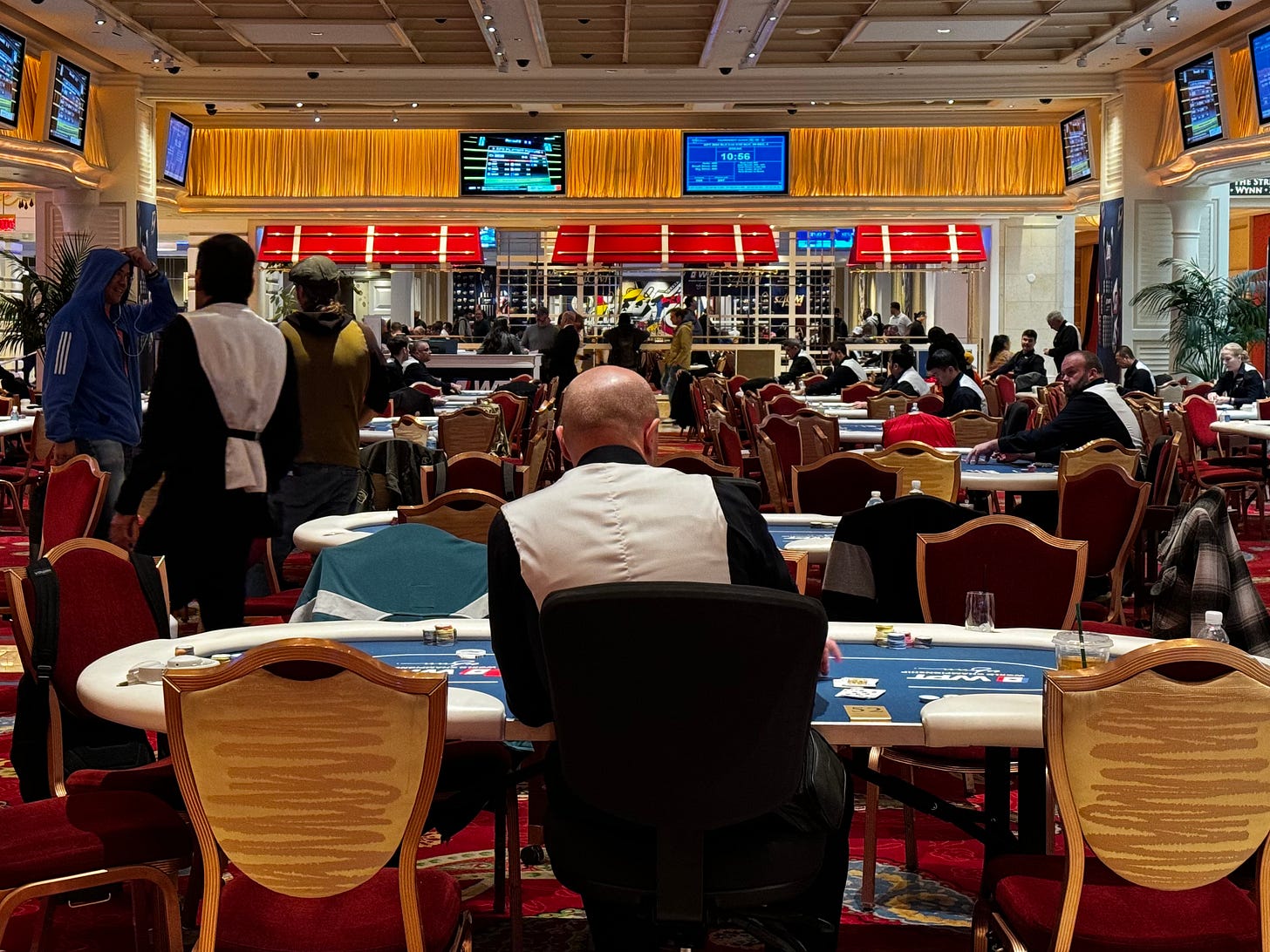What I Learned Playing at a World Poker Tour Tournament
The beginning of my journey into the world of poker.
If you’ve been supporting me and my work on my Patreon page, you may be aware that I’ve recently started taking poker playing seriously (specifically: Texas Hold’em). I’ve always loved playing poker but I’ve never been particularly good at it. I found the sheer amount of skill and memorization required to be daunting. But for a variety of reasons, I’ve recently decided to really try to make a go of getting good at this thing.
I play cash games at a local poker room but I also enjoy poker tournaments, which require everyone to buy in for a set amount of money (often in the hundreds of dollars) and then play until only a few players remain, each of whom receives a payout from the prize pool. When I discussed this on a recent Patreon podcast, one of my Patrons (thanks Vincent!) made me aware of the fact that the World Poker Tour was actually holding its annual event in Las Vegas throughout the month of December. The main poker event is a $10,000 buy-in tournament that lasts about a week, with a top prize in the millions of dollars.
I’m not ready for that yet.
But the WPT also has a bunch of smaller, side tournaments and these felt considerably more achievable: $600 buy-in for a chance at winning a few hundred grand if you make it to the final table. So I decided to journey down to the Wynn Poker Room in Las Vegas to find out something I’ve always wondered: What’s it like to play at a Vegas poker tournament?
The Wynn Poker Room has an excellent reputation. The place is clean, well-run, and has professional dealers and floor managers. For the tournament, dozens of tables have been set up in the sports betting area near the regular poker room and dealers come in from all around the country to facilitate play. It’s quite a sight to behold: hundreds of players riffling their chips, with dealers managing each table and flipping over the cards that will decide each person’s fate. Overall, I’m impressed with how well run the entire event is, given the sheer quantity of people that need to pass through the Wynn’s doors.
During the course of the week, I’ll enter the tournament a few times for a chance of making it to the second stage of the tournament, where everyone is “in the money.” What follows are a few things I observed on my journey:
The stigma around poker is mostly gone
Here’s a lesson I learned before I even got to the tables: For a good chunk of my life, poker was perceived as gambling and gambling is perceived as adjacent to many other unsavory vices. But in recent years, I think people have really come to understand Hold’Em as a game of skill. The rise of the Poker Industrial Complex, with major prestigious events hosted by the World Series of Poker and the World Poker Tour, have also aided this perception.
Since I started posting about poker on my Patreon and on my Instagram, I’ve received so much encouragement from all kinds of people, both friends and strangers alike. No one has looked askance at me sinking a bunch of time and money into this hobby (or if they have, they haven’t voiced it to me directly). I also think poker has accrued a kind of cultural cache — it’s cool to be good at poker! And therefore it is widely accepted to encourage people to follow their poker-playing dreams.
All that said, my poker trip is not something I felt the need to bring up at Thanksgiving dinner with my parents.
You only need money to get in
One of the things I appreciate about poker is that anyone can be a star. You don’t need to come from a wealthy background or navigate an impossibly labyrinthine series of qualifying events. All you need to do is be able to afford a buy-in and you can be a champion.
This is certainly true of events at the World Poker Tour and the World Series of Poker. Anyone can walk in off the street with whatever the dollar amount you need for a tournament (anywhere from $600 to $10,000) and if you play your cards right (literally), you can be rubbing elbows with the poker-playing royalty at the final table.
All that said, I did find that by the time I got to the late stages of the tournament, everyone was pretty damn good at the game. Very few people showed up just to have fun. A good 60-80% of them felt like skilled players who knew exactly what they were doing and were functioning at the highest level. Money can get you in but it can only get you so far.
Poker is grueling
If you decide to play poker at a major tournament, you’ll be sitting in the same room for 8-12 hours, sometimes at the same table for hours at time. At my tournament, a 15-minute break was provided every 2 hours (and a longer one for dinner), but otherwise, if you’re hoping to do things like eat food, take a walk, or go to the bathroom at a time that you prefer without impacting your gameplay, you’re in the wrong place. Oh, and did I mention that you’ve paid hundreds of dollars to be at the tournament and that a single mistake could cost you all of that money?
What I learned on my trip is the sheer amount of focus required to play in such a setting. You constantly need to keep track of how much money you have, how much money is in the pot, the blinds, the ante, the pot size, your odds of making the winning hand, pot odds, implied odds, the skill level of everyone around you, and so much more, continuously for up to 12 hours — all while you are constantly at risk of getting hungry, tired, and dehydrated. It’s a lot to keep track of and it’s exhausting.
One thing that helps is bringing a bag of supplies to the tournament. In my bag: Protein bars, diet Red Bull, water, extra masks, and a medium-sized bottle of hand sanitizer. It definitely came in handy and I was surprised to see not many others had taken advantage of the privilege. Even something that can give you a 1-3% edge is worth it and staying hydrated and well-fed definitely made me feel more able to be in the zone for longer.
Poker is lonely
At least from what I’ve been able to witness and read about, poker is a pretty lonely game. Tournament poker specifically is a grueling ordeal where you are locked in an hours-long battle of wits with other players whose only objective is to survive until the end. Any camaraderie is short lived because at the end of the day, everyone is always looking out for themselves.
People often travel to these events by themselves, and in the early stages of a tournament, there’s no one in the stands to cheer you on. Unlike team sports, you’re not alongside other folks to win anything. Instead, you’re trying to eliminate literally everyone else around you. To me, it doesn’t seem like it’s a game for people who thrive on human contact.
While smartphone use is not allowed while you’re playing in the hand, you are allowed to use your phone when you’ve folded. For the duration of the tournament, I started up a thread with a bunch of friends and gave them intermittent updates on my progress while they cheered me on and discussed some of my hands. It was a lot of fun and really helped alleviate that feeling of isolation that seems extremely common to the game. Would recommend!
Nothing can defeat the role of luck in the short run
In the long run, any great poker player will annihilate any amateur. But in the short run, a single bad play or an unlucky hand is enough to knock you out of a tournament completely. I saw so many hands that showed down where one hand was clearly the favorite (e.g. pocket aces, the best hand you can possess before the flop), only to get dominated by an unlucky turn of the cards. These were excellent players who played every hand exactly correctly, only to be unceremoniously eliminated because some rando sucked out on them.
[Side note: it was always a sobering feeling when someone was eliminated. You could feel the weight of the $600 that that person lost, and a tiny voice inside speaking: “There, but for the grace of God, go I.”]
Dan Harrington has written a lot about the role of luck in poker tournaments, saying (and I’m paraphrasing) that every person who makes it to the end has had to make several all-in bets at some point or another, praying for a miracle. For the people at the final table, that miracle came, perhaps more than once. For everyone else, it didn’t.
But that’s what’s great about learning how to play poker: I’m learning to separate the quality of decisionmaking from the result, which is something I find really hard to do in the rest of my life. Don’t ask yourself whether you won the hand or made it to the next day. Instead ask: Did I make the right play? Did I raise the right amount and at the correct time? Did I make the right read? These are all questions that you can reflect on and work on — things you have control over.
And there is freedom in letting go of where things go after that. Becuase everything else you have to leave to the Poker Gods to decide.
So how did I do?
On my second entry, I played with 300 other players for 8 hours and came within 10 slots of being “in the money” and advancing to day 2 (I was eliminated with 47 players remaining. 37 players advanced). It was the closest I’d get but ultimately, I didn’t make it this time. The hand that broke me? I went all in with Ace-6 and a guy called me with a pair of 5’s. The 5’s held up.
Oh well. Better start studying for next year.
I hope you enjoyed this post! If you did, let me know if you’d like more poker-related content tin the future. Special thanks to all those who supported me on this trip, including Patrons Stephen and Vincent who offered to stake me for a couple entries, my wife for her generous and patient support of this pursuit, as well as David Cho, my brother Michael, and everyone else who sent me a kind word via Instagram/Patreon/text for their encouragement.
Other Stuff David Chen Has Made
[PAID ONLY] I discussed my experience in Vegas on my Patreon podcast. If you enjoyed this post, becoming a Patron is the best way to support me.
Over on Decoding Reality, Justin and Daejah covered the shocking finale to The Golden Bachelor. Check out their conversation here.
On Decoding TV, Jessie Earl and I had a chance to cover the first half of Invincible season 2 on Prime Video. A partial season with some great moments that’s really hurt by its pacing/release schedule.
Also on Decoding TV, Patrick Klepek and I continue our coverage of The Curse on Paramount+/Showtime, which has become one of my favorite TV shows for how painfully awkward it is to watch.
On The Filmcast, we reviewed Napoleon, a movie all three of us found disappointing for various reasons. Here’s hoping the director’s cut will be good?








Thanks for sharing, Dave! I, too, am a long time poker fan/player who is beginning to take it more seriously. As with any skill, practice and repetition has been key for me. A lot of poker rooms offer smaller, weekly tournaments with buy-ins for around $100. I find it's a much less cost-prohibitive way to get in a lot of good, real-world practice. Next time you're in Las Vegas, most of the big casinos have tournaments going on constantly, so when you get knocked out of one, you can hop over to the next and keep going. A lot of fun and a good way to work on your game. Good luck, and I look forward to hearing more about your poker adventures in the future!
great write up of your experience and congrats for making it so far on your first try!